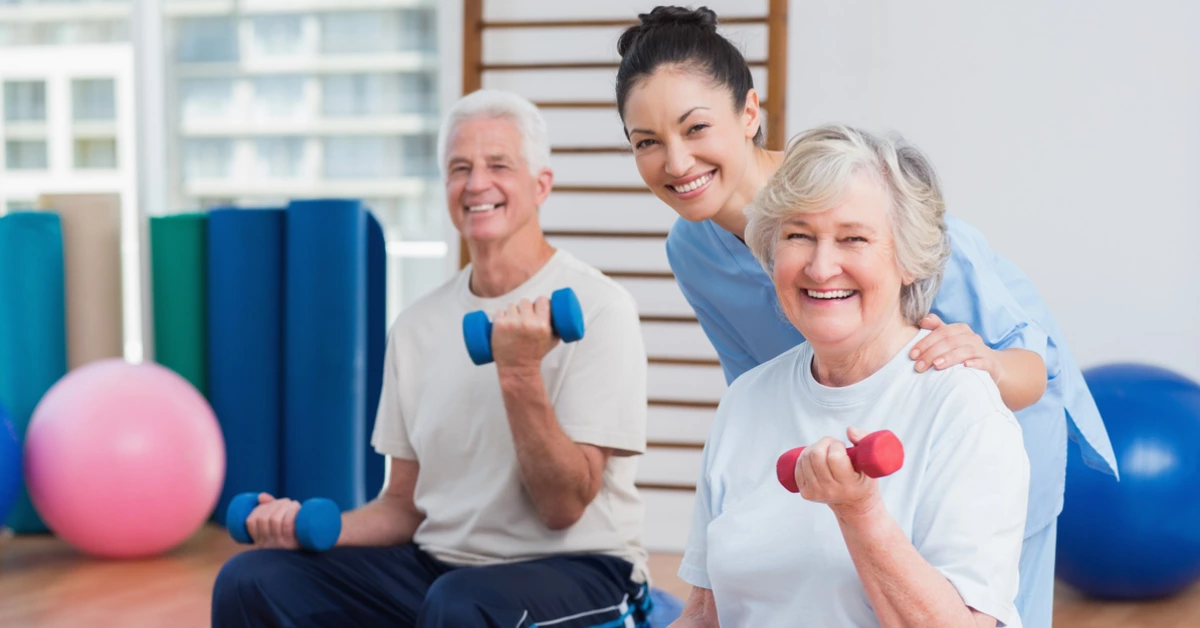It may come as a surprise to some, but physical inactivity is just as harmful to our health as smoking and a poor diet. In fact, exercise has a significant effect on many chronic diseases and can steer one away from the risks of cancer, diabetes, heart disease and other all-too-common illnesses.
Indeed, exercise plays a critical role in enhancing the quality of life, keeping you independent, and boosting both physical and mental health. So, how can seniors stay fit and healthy in their retirement years?
Let’s explore some practical exercise tips for seniors to keep you moving and feeling great.
The Importance of Exercise for Seniors
Exercise is more than just a way to stay in shape; it’s a cornerstone of a healthy retirement. Regular physical activity helps improve cardiovascular health, increases muscle strength, and enhances flexibility and balance. These benefits are crucial in reducing the risk of chronic diseases like heart disease, diabetes, and arthritis. Moreover, exercise has been shown to boost mental health by reducing symptoms of depression and anxiety while improving cognitive function.
Maintaining an active lifestyle during retirement helps seniors retain their independence, ensuring they can continue to enjoy daily activities without significant limitations. This independence contributes to a better quality of life and a more fulfilling retirement experience.
Choosing the Right Exercises
Selecting the appropriate exercises is key to staying fit and healthy. Focus on low-impact activities that minimize the risk of injury while providing substantial health benefits. Some excellent options include:
- Low-impact aerobics: Activities like walking, swimming, and cycling are gentle on the joints while effectively improving cardiovascular health.
- Strength training: Using light weights or resistance bands can help maintain muscle mass and bone density, reducing the risk of osteoporosis.
- Flexibility exercises: Stretching and yoga can enhance flexibility, balance, and coordination, which are vital for preventing falls.
Before starting any new exercise routine, it’s important to consult with a healthcare professional to ensure the chosen activities are safe and appropriate for your health condition.
Safety Considerations
While exercise is beneficial, being mindful of safety is just as important to avoid injuries. Seniors are more prone to falls and other accidents, so you’re encouraged to take precautions. Here are some safety tips:
- Exercise in a safe environment: Choose well-lit, clutter-free areas to exercise.
- Wear proper footwear: Supportive shoes can prevent slips and falls.
- Use assistive devices if needed: Items like handrails or stability balls can provide additional support.
By following these safety measures, you can minimize risks and enjoy a safe and effective exercise routine.
Incorporating Exercise into Daily Life
Integrating exercise into your daily routine doesn’t have to be daunting. Simple changes can make a significant difference. Here are a few ideas:
- Short walks: A brief walk after meals can aid digestion and increase your daily step count.
- Chair yoga: Performing yoga stretches during commercial breaks or while watching TV can improve flexibility and reduce stiffness.
Making exercise a habit is easier when it’s part of your daily schedule. Aim to set aside specific times for physical activity, just like any other important appointment.
Staying Motivated
Staying motivated to exercise can be challenging, especially if you’re feeling tired or self-conscious. However, staying active is vital for your well-being. Here are some tips to keep you motivated:
- Find an exercise buddy: Having a partner can make exercising more enjoyable and hold you accountable.
- Track your progress: Keeping a log of your activities and achievements can boost your motivation.
- Reward yourself: Celebrate small milestones with a treat or a new piece of workout gear.
Staying motivated is about finding what works best for you and making exercise a fun and rewarding part of your routine.
Additional Resources and Tips
Many resources are available for seniors looking to start or maintain an exercise routine. Local senior centers often offer exercise classes for seniors, providing a social and supportive environment. Additionally, online exercise programs can be a convenient option for those who prefer to work out at home.
Here are some general tips to keep in mind:
- Stay hydrated: Drinking enough water is crucial, especially during and after exercise.
- Listen to your body: Pay attention to how you feel and avoid overexertion.
- Seek professional help if needed: Physical therapists or personal trainers can provide personalized guidance and support.
Wrapping Up
Staying fit and healthy in retirement is all about finding the right balance of activities that you enjoy and can safely perform. By incorporating exercise into your daily routine, choosing the right activities, and staying motivated, you can maintain an active and fulfilling lifestyle.
The great thing about living at a Levante retirement residence is that exercise and wellness are thoughtfully integrated into your daily life. With diverse exercise classes designed to meet each person’s individual needs, you’ll have no problem getting the movement you need to stay active and fit.
Remember, the journey to a healthier retirement starts with a single step, so why not take that step today? For more information on how to maintain your health and wellness, explore the Levante wellness programs.
Retirement is the perfect time to focus on your well-being and enjoy the activities you love. With these exercise tips for seniors, you can ensure that your retirement years are active, healthy, and full of life.

